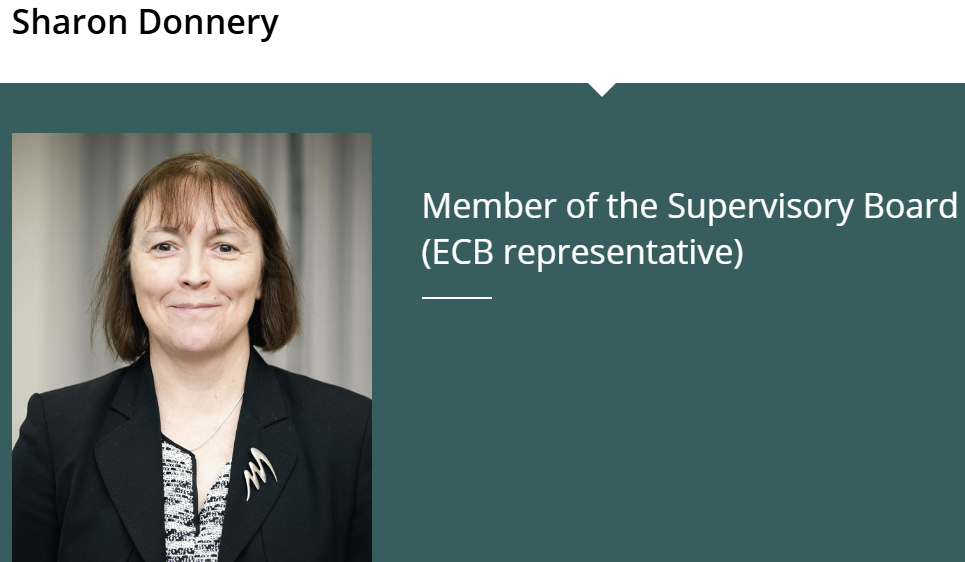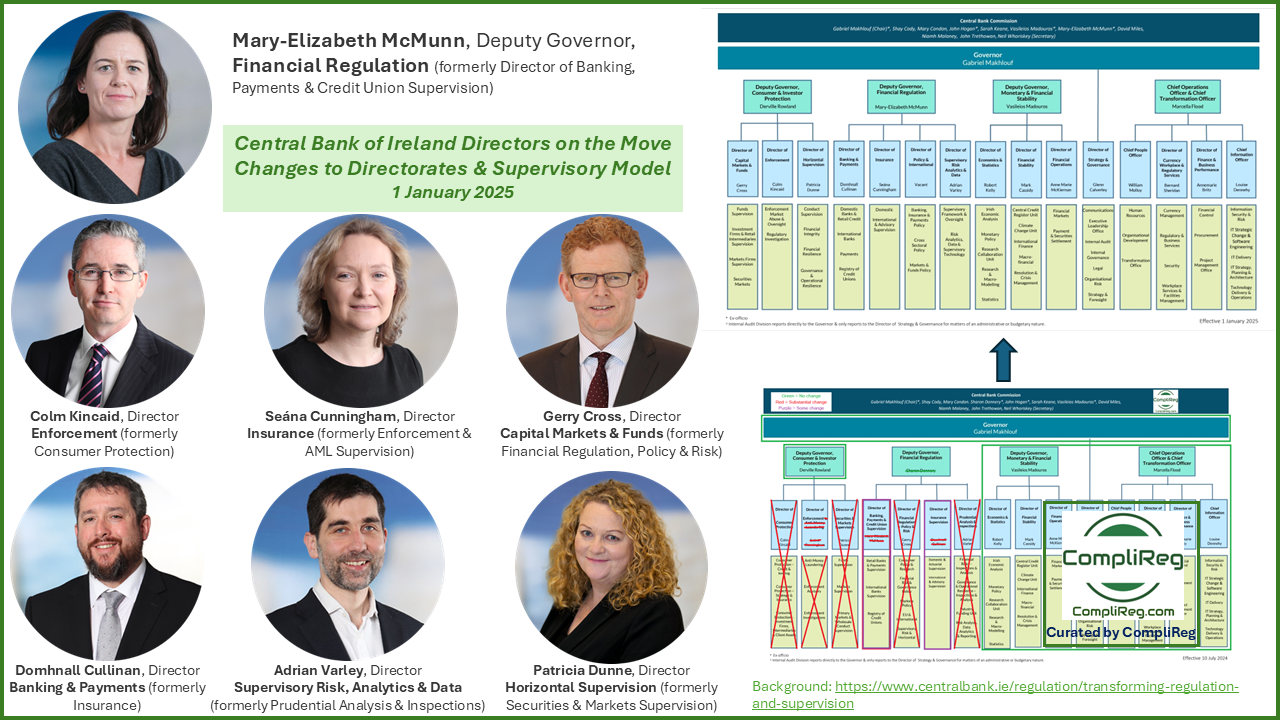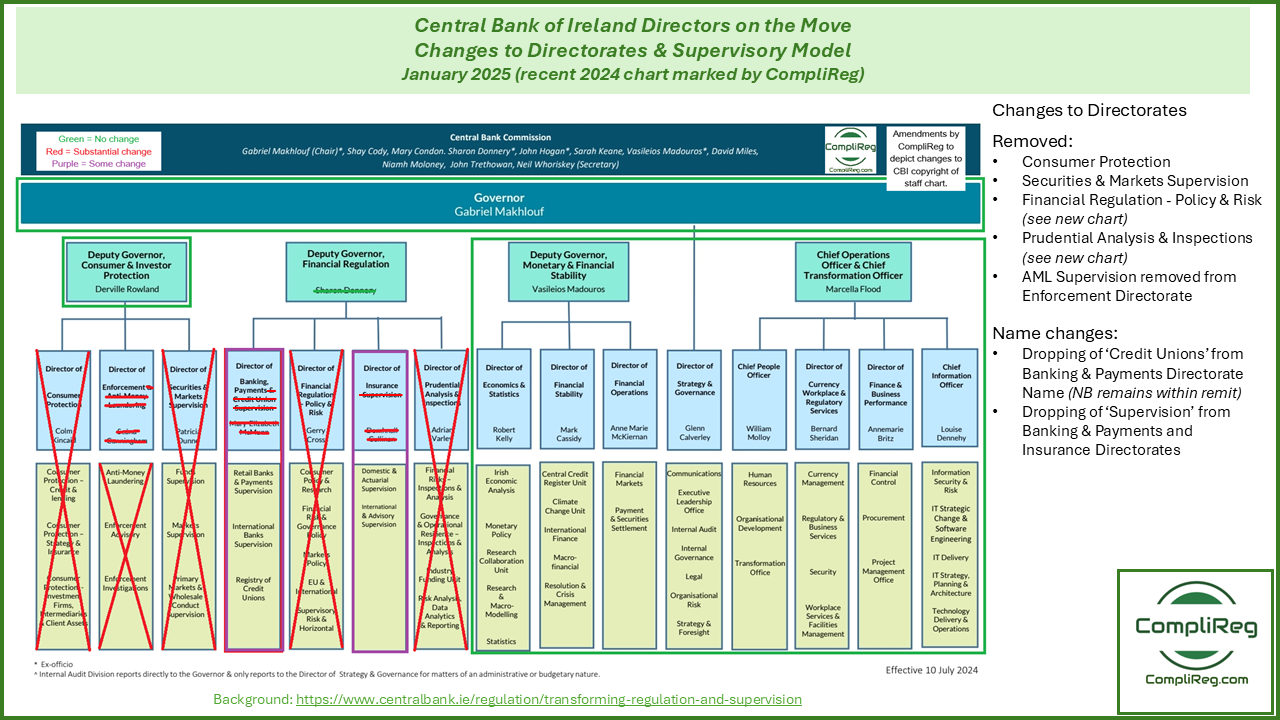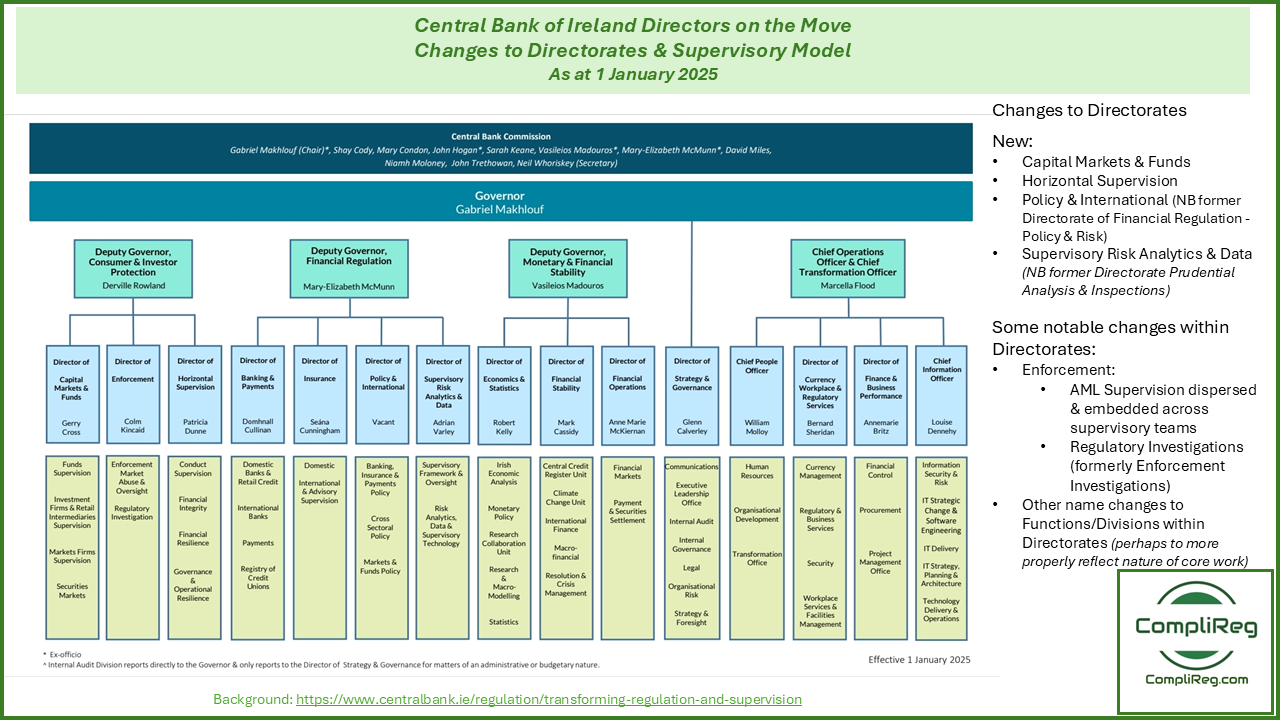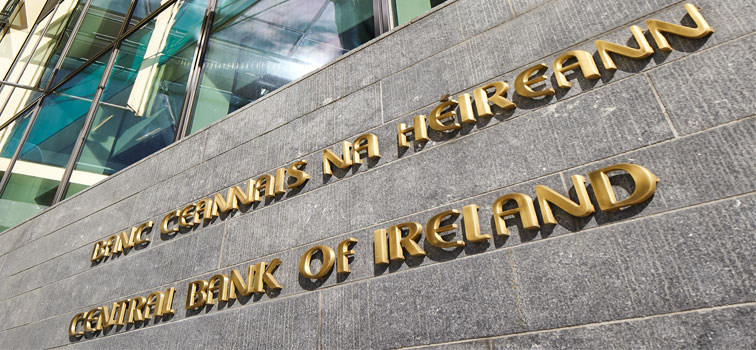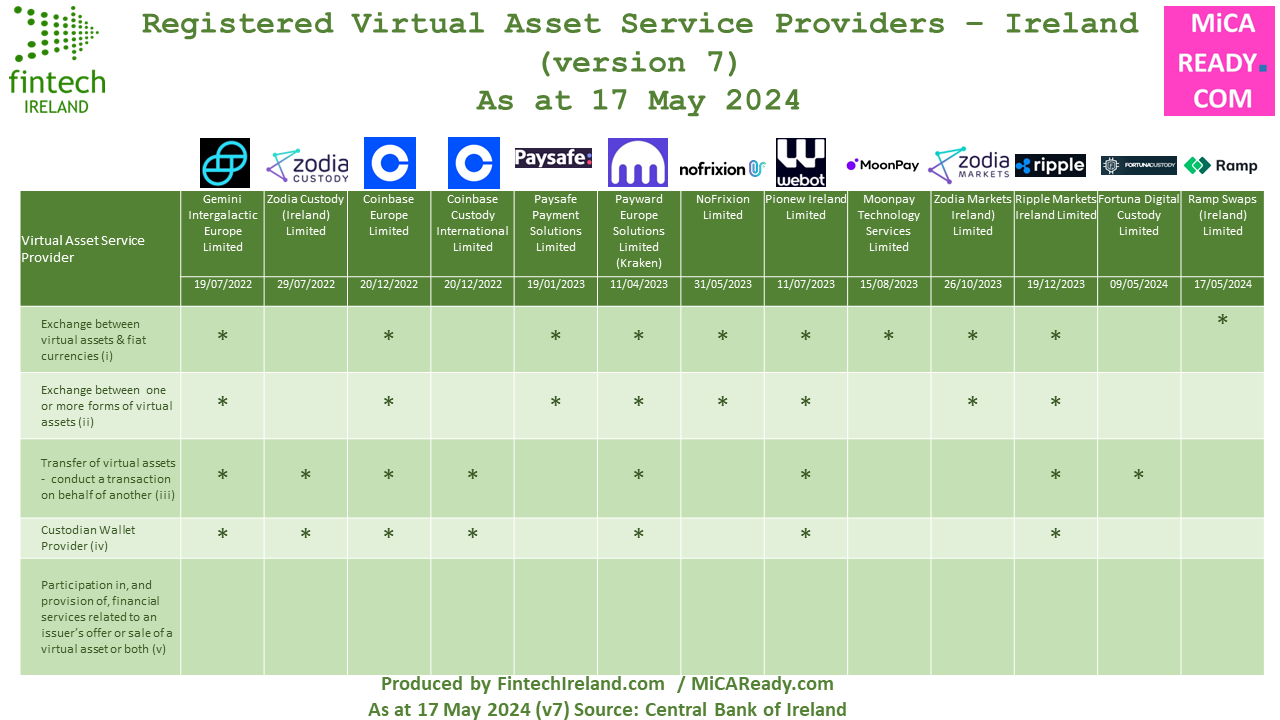AuthorPeter Oakes is an experienced anti-financial crime, fintech and board director professional. Archives
January 2025
Categories
All
|
Back to Blog
Cohort #1 of Central Bank of Ireland’s Innovation Sandbox Programme: ‘Combatting Financial Crime’9/1/2025 Seven participants of the Central Bank of Ireland’s Innovation Sandbox Programme on ‘Combatting Financial Crime’ are: 1) AMLYZE is building an AML/CFT information-sharing framework that will use structured taxonomies and synthetic data to simplify detecting and preventing fraudulent activities. 2) Expleo Group has developed an anti-SMS fraud solution which installs on mobile phones to combat SMS fraud. 3) Forward Emphasis and Pasabi’s joint innovation will develop and test a Motor Insurance Application Fraud Analytics solution, leveraging AI-driven behavioural analytics, machine learning, and pattern recognition to detect fraud in the pre-sales process. 4) Roseman Labs enables secure, GDPR-compliant collaboration and analysis on sensitive data for regulated industries. 5) Sedicii (hello Rob Leslie) and PTSB Sedicii has partnered with PTSB to create a secure and private collaboration using zero knowledge proofs to verify names and addresses, in real-time, as part of their customer KYC process, using ESB Networks as the authority for address data in Ireland in full compliance with GDPR and which involves no sharing of personal data. 6) TrustElevate.com offers a privacy-preserving solution for verifying parental responsibility and child age. 7) Vidos.Id is developing digital identity verification solutions to help financial institutions verify digital identity documents and wallet-based credentials. There are many familiar names here and a couple we hadn't encountered at www.moneylaundering.ie and www.fintechireland.com. Since this all very serious hashtag#regtech, we better dust off the www.regtechireland.com website! All the best to the cohort. First posted here Combatting Financial Crime Theme The theme of the Innovation Sandbox Programme is: “Combatting Financial Crime – Through the use of innovative technology, foster and develop innovative solutions that minimise fraud, enhance KYC/AML/CFT frameworks, and improve day-to-day transaction security for consumers.” The programme will encourage collaboration across the ecosystem to support the fight against financial crime. Programme outputs will include inter alia the documentation and sharing of learnings in fraud prevention and detection. The programme also aims to facilitate the development of new ventures and new business models that solve challenges identified in this sandbox theme and facilitate the faster and safer deployment of substantially new technologies, products, or services. The Sandbox Programme framework comprises:
What is the Challenge?
What are the Problem Statements?
Read more here
0 Comments
Read More
Back to Blog
Sharon Donnery joins the European Central Bank as its representative to the Supervisory Board.
Sharon joins the ECB from the Central Bank of Ireland, where she served as a Deputy Governor, leading a wide range of initiatives in financial regulation and monetary policy. With her extensive central banking and supervisory experience, including her role as Ireland’s representative to the Supervisory Board and a member of the European Systemic Risk Board’s General Board, Sharon brings invaluable insights and expertise to our work. See also:
Back to Blog
Linkedin Post: Central Bank of Ireland Directors on the MoveThree weeks ago our Peter Oakes posted the news that Mary-Elizabeth McMunn (formerly Director of Banking, Payments and Credit Unions) at the Central Bank of Ireland was appointed, effective 1 January 2025, as Deputy Governor Financial Regulation at the Central Bank. This followed news that now former Deputy Governor, Sharon Donnery, had accepted appointment by the European Central Bank to be its representative of the Supervisory Board. Over the past few weeks various bits and pieces of news about other moves within the Central Bank executive team has dripped into the media. As at the start of January 2025 we now have official confirmation of those movements. These are:
* See below for details of changes to Directorates Changes to Central Bank of Ireland DirectoratesAs part of its changes to its supervisory approach while keeping a risk-based supervisory model approach, the Central Bank of Ireland has adopted a new operating structure to include seven directorates, which will report into the existing Deputy Governors for Financial Regulation and Consumer and Investor Protection:
New look and feel of the Central Bank of Ireland's Financial Regulation and Consumer & Investor Protection Deputy Governor FunctionsIn addition to the points raised above arising from the changes to the operating structure at the Central Bank of Ireland, it is worth noting/amplifying that:
Sources / Further reading:
Back to Blog
Repeat of News Release:
The Central Bank of Ireland has today (Thursday 19 December 2024) announced the establishment of a dedicated Fitness and Probity Unit. The fitness and probity regime is a critical element of financial regulation; protecting the public interest by ensuring that people who work in key positions in a financial firm are competent and capable, honest, ethical and of integrity and financially sound. Since 2020 the Central Bank of Ireland has approved appointments to more than 11,000 roles under the regime. Speaking today, Governor of the Central Bank of Ireland Gabriel Makhlouf said: “The Enria report, published in July 2024, identified several key areas for improvement in our operation of the fitness and probity regime. We accepted the findings of the report and have used them as a basis for implementing reforms to enhance the regime’s overall effectiveness. We also committed to implementing the reforms as early as possible and before end 2024. “Today’s announcement of the establishment of our new dedicated Fitness and Probity Unit within the Bank is a key element of this programme of reform. “However, we recognise that this is only a first step towards delivering a fitness and probity gatekeeping process aligned with the spirit and approach of the report. As such, work will continue in implementing and delivering a regime which supports supervisory judgement, while delivering robust, fair and transparent processes. “The new unit will be staffed from within our existing complement by experienced regulators from across the Bank." “Our strategic plan committed to transforming our approach to regulation and supervision – this process is ongoing and our new operating structure, including the dedicated fitness and probity team, will be in place from the start of the new year.” Source: https://www.centralbank.ie/news/article/central-bank-establishes-dedicated-fitness-and-probity-unit
Back to Blog
The Independent Review of the Fitness and Probity Regime by Mr Andrea Enria, the former Chair of ECB Supervisory Board has been published by the Central Bank of Ireland. Speaking for the Central Bank of Ireland, its Governor (Gabriel Makhlouf) has confirmed that all of the recommendations in the review are accepted by the regulator. One of the immediate actions arising from the recommendations is the creation of a new unit to bring together F&P activities that are currently dispersed across the Central Bank. Those who called for an external decision making process should note the following view of Andrea Enria: "To externalise the decision making process would therefore likely not serve the objective of ensuring decisions are made in a more timely manner. This suggests that an appropriate balance is found, including elements of independent challenge within the structures of the Central Bank" at page 50. Copy of the Review here Extract of the Recommendations here Summary of the 12 RecommendationsA summary of the 12 Recommendations appearing at Appendix 1, page 79 onwards, are as follows:
Recommendation 1 – Fostering industry role in gatekeeping - guidance should clearly outline the key, proportionate expectations of the Central Bank as regards the process that a regulated entity engages in prior to submitting an application for a PCF approval a) due diligence/screening b) background checks c) documentation and record keeping d) on-going monitoring Recommendation 2 – Clear fitness and probity standards - recommendations made in following areas to further enhance the effectiveness of the fitness and probity standards and guidance issued by the Central Bank a) accessibility of the F&P standards b) enhance the F&P Standards c) regularly review and update standards: establish a process for regularly reviewing and updating F&P standards d) holistic consideration of complementary powers Recommendation 3 - Governance a) establishment of an F&P gatekeeping unit with responsibility for the entire gatekeeping process b) enhanced implementation of a risk-based approach for F&P gatekeeping, with a reconsideration of the overall number of PCF roles and a possible adjustment in the approach to different sectors including to the funds sector, which is the largest contributor in terms of applications Recommendation 4 – Decision making a) legal advice on any PCF Gatekeeper applications should only be provided by the in-house Legal Division. b) Minded to Refuse Letters to include a draft decision including and address all relevant concerns, relevant law and issues along with written responses to any arguments raised by the applicant c) a significant decisions committee would be established within the Central Bank d) the Chair of the committee should have authority to decide upon composition based on the features of the underlying case e) legal advice at the decision making stage should only be provided by the General Counsel to the Central Bank Recommendation 5 – Communication and IT platform a) the Central Bank should organise an annual information session open to both firms and potential candidates b) ad hoc workshops should be organised to obtain feedback from firms on the functioning of the Online Portal for applications and other possible improvements Recommendation 6 – Interview stage a) interview notification b) duration of the interview c) setting of interviews and comments on minutes (further, the setting for the interviews should remain conversational, rather than adversarial) d) the Central Bank should adopt as a principle that it will provide feedback in all cases where an interview has been conducted Recommendation 7 – Efficiency of interview process - two recommendations (a) recommended that “meet and greet” type interviews should not form part of the F&P gatekeeping process; and (b) the Central Bank should aim to conduct a single comprehensive interview to reduces potential for unnecessary duplication, such as conducting an initial assessment interview followed by a specific interview, particularly when a specific issue is known in advance Recommendation 8 – Withdrawals/feedback - Central Bank should adopt as a principle that it will always provide feedback to both the regulated entity and the individual after an interview. It is further recommended that such feedback be provided also in cases where a withdrawal occurs Recommendation 9 – Management information a) clear and comprehensive service standards - to promote transparency and avoid confusion, service standards should be clear, comprehensive and cover all relevant aspects of the process b) time limits - the Central Bank should commit to a set timeframe within which it will have processed to conclusion all F&P applications c) reporting - the Central Bank should enhance transparency by publishing standardised information, with appropriate breakdowns, on at least an annual basis d) reporting - Data Points e) reporting - Qualitative points: In providing the above information the Central Bank should have regard to the following qualitative points Recommendation 10 – Quality assurance - a robust quality assurance mechanisms should be set in place. This work should be conducted by staff of the Central Bank with the oversight of an externally appointed risk advisor to the Central Bank Recommendation 11 – Complaints procedure - complaints process should be established specifically for the F&P gatekeeping process Recommendation 12 - Training - develop a comprehensive training programme for the F&P gatekeeping process; the process to be adopted including any risk framework overlay, conduct of interviews and provision of feedback
Back to Blog
Central Bank of Ireland lays out its expectations of firms seeking crypto licensing in Ireland29/5/2024 If you are looking to get authorised under Markets in Crypto Asset Regulation (MiCAR) in Ireland, the Central Bank of Ireland has confirmed (or perhaps reconfirmed in some people's minds) that regulator intends to open its MiCAR authorisation gateway in early QUARTER 3 2024. While VASPs operating under the VASP regime prior to 30 December 2024, under MiCAR, will be permitted, post 30 December 2024, to avail of a transitional period enabling them to continue to operate for up to 12 months or until their CASP authorisation is granted or refused, whichever is sooner the CBI says that in respect of firms not yet registered as VASPs its experience is that period of at least ten months is required to conclude the assessment of a VASP application. The CBI says such firms should focus their efforts on preparing for a CASP application (under MiCAR) rather than seeking a VASP registration at this time. For those VASPs that have already applied for a registration but have not reached the end point of the process, the CBI will continue to assess these applications and will engage bilaterally with these firms on the progress of their applications. Following Ramp Swaps (Ireland) Limited's registration as a VASP, the latest such registration in Ireland, there are now 13 registered virtual asset service providers in Ireland and potentially a few more to come. Get in touch with CompliReg and see MiCA Ready if you are looking to get a MiCAR authorisation in Ireland or elsewhere in Europe. Firms looking to get authorised in Ireland as a CASP or registered in near future as a VASP should note the following extracts from a speech today by Gerry Cross, Director for Financial Regulation, Policy and Risk at Blockchain Ireland's excellent event this week (see link at end of article)
Source: Technological innovation and financial regulation – a maturing relationship - Remarks by Gerry Cross, Director for Financial Regulation, Policy and Risk, Wednesday 29th May 2024 Linkedin Post: https://www.linkedin.com/posts/peteroakes_micar-virtualasset-activity-7201513163152834560-N6m7
Back to Blog
Sign up to the Fintech Ireland Newsletter here.
This blog and others are joint efforts between Fintech Ireland and CompliReg. First Published Tuesday 9th April 2024
Before we dive into the detail contained in the new (issued 9 April 2024) "Central Bank Expectations for Authorisation as a Payment Institution or Electronic Money Institution, or Registration as an Account Information Service Provider", a couple of things to note:
Back to Blog
All these issues, in themselves, are sufficient for a finding that, at the assessment interview, there was an absence of fair notice sufficient to conclude that this part of the process fell below the standard of constitutional fairness. We are unable to conclude that the decision reached was the correct and preferable decision. There were fundamental procedural flaws which were to be found at all three stages of the process. The Tribunal is satisfied that taken cumulatively – or even individually – the various procedures adopted by the Central Bank did not comply with the requirements of Constitutional and natural justice; including the necessity for fair notice; the duty to give reasons; and the observance of the principle of audi alterem partem. [Latin for "hear the other side"] Interested in the Central Bank of Ireland's internal and often called 'opaque' fitness and probity assessment process? In which case take the time to read this decision (link below) by the Irish Financial Services Appeals Tribunal - an independent body - to which appeals lay from Central Bank decisions. The Appeal involved a finding by the Central Bank that: "in its “opinion”, the Appellant was “unfit” to hold the two positions in question.". The Appellant, identified as AB, was applying for (as it was then) PCF2 (NED) and PCF3 (Chairman). While the identity of the Appellant is not made known, we know the person is male and he held "similar roles to those which he was applying for in Redhedge and other regulated entities in the same sector." The crux of the order appears at para 325 on page 79 of the decision (here): "We are unable to conclude that the decision reached was the correct and preferable decision. There were fundamental procedural flaws which were to be found at all three stages of the process. The Tribunal is satisfied that taken cumulatively – or even individually – the various procedures adopted by the Central Bank did not comply with the requirements of Constitutional and natural justice; including the necessity for fair notice; the duty to give reasons; and the observance of the principle of audi alterem partem." [[Latin for "hear the other side"] The impugned decision was one which had serious legal consequences, where fundamental legal and constitutional principles had to be applied in the course of performing the statutory functions The Central Bank called the Appellant to what is known as an “assessment interview” and then a “specific interview”. These made adverse findings. There followed a “minded to refuse” letter to the ultimate decision-maker. She largely confirmed these adverse findings and held the Respondent [i.e. the Central Bank] entitled to refuse the applications. There is a lot here for the Central Bank to consider and take stock of. And hopefully it does. While there was the appearance of fair procedure, there was an absence of its substance Summary of certain facts In summary (all the below are direct quotes from decision**):
Costs:
** to ensure that you are aware of the context from which the above quotes are extracted, do read the decision for yourself. A copy of the decision is located here Linkedin Post here. Do check out the Linkedin page as it contains lots of additional information. The Central Bank of Ireland issued a statement on its website saying:
Back to Blog
The announcement in the media that Coinbase is selecting Ireland as its EU regulatory headquarters has sparked quite a lot of discussion in crypto regulatory circles. Myself and a few others have been thinking about similarities between the race for a MiCAR authorisation [either from a standing start or from the position of already being a Virtual Asset Services Provider registrant in the EU] and the race for UK regulated firms needing an EU home post Brexit. In particular, I recall certain member states doing road shows on why a UK regulated firm should choose its country. While in Ireland, when challenged by the representative bodies and gatekeepers about doing more, the Central Bank of Ireland responded in speeches that it was in no one's interest to get involved in a race to the bottom. Will we not see something similar when it comes to MiCAR? Just because company A has a VASP registration in EU country A, it could make sense but, it doesn't necessarily follow that it will pursue a MiCAR authorisation in EU country A. That is more so the case, arguably, when they have VASP registrations in EU countries B, C and others (because there is no passporting). Therefore, and I am already seeing it myself, there are EU countries laying out their stall for your MiCAR authorisation regardless if you are (or not) already registered there as VASP. Some EU countries argue that their current VASP registration (& remember it was only ever intended to be a mere registration) is so robust and already aligned to MiCAR that you will find its offering a fast, efficient & effective way to getting the authorisation crown. I suspect other member states might take a political or supervisor risk-based decision not to exceed their obligations when dealing with a MiCAR authorisation and - potentially adding things into the authorisation process - to unintentionally but effectively killing-off an application. And, while it is great to hear of a large digital asset player laying down the marker that Ireland will be its EU regulatory home, I have lost count of how may MiFID, emoney and payment firms that have told me that "Ireland is the only country for our company", only to find that their view changes during the course of the authorisation process for whatever reason. I've seen companies apply elsewhere while pursuing an application in Ireland and I have spoken to some of those companies 18 months latter when they discovered the grass wasn't greener in the other EU member state. Against that backdrop, very interesting to read the Chair (Verna Ross) of European Securities and Markets Authority (ESMA) letter of 17 October 2023 to Nadia Calviño President of the Economic and Financial Affairs (ECOFIN) Council of the European Union, saying a number of important things about the MiCAR authorisation infrastructure. Of the many points made by ESMA in its letter, the following ones caught our eye.
The letter was cced to:
* Mairead McGuinness, Commissioner in charge of Financial Stability, Financial Services and Capital Markets Union, European Commission; * Irene Tinagli, Chair of the Committee on Economic and Monetary Affairs, European Parliament; * John Berrigan, Director-General, DG Financial Stability, Financial Services and Capital Markets Union, European Commission; * Thérèse Blanchet, Secretary-General of the Council of the European Union Union; * Claudia Lindemann, Head of the Secretariat of the Committee on Economic and Monetary Affairs, European Parliament
Back to Blog
Australia to regulate digital asset platforms
Regulating digital asset platforms - Australia What is this about? The Australian government intends to introduce a regulatory framework to address consumer harms in the crypto ecosystem while supporting innovation. The introduction of a regulatory framework for entities providing access to digital assets and holding them for Australians and Australian businesses is an important step in the government’s approach to crypto reform in the Australian context. The proposed regulatory framework would apply to digital asset platforms that present similar risks to entities that operate in the traditional financial system. It proposes to leverage the Australian financial services framework to regulate digital asset platforms to ensure consistent oversight and safeguards for consumers. The government seeks views from interested parties on the proposed framework for regulating digital asset platforms. Specific consultation questions are outlined within the paper. Responding You can submit responses to this consultation up until 01 December 2023. Interested parties are invited to comment on this consultation. While submissions may be lodged electronically or by post, electronic lodgement is preferred. For accessibility reasons, please submit responses sent via email in a Word or RTF format. An additional PDF version may also be submitted. All information (including name and address details) contained in submissions will be made available to the public on the Treasury website unless you indicate that you would like all or part of your submission to remain in confidence. Automatically generated confidentiality statements in emails do not suffice for this purpose. Respondents who would like part of their submission to remain in confidence should provide this information marked as such in a separate attachment. Legal requirements, such as those imposed by the Freedom of Information Act 1982, may affect the confidentiality of your submission. Key Documents
How To Respond
Financial System Division Treasury Langton Cres Parkes ACT 2600 Further Reading: https://treasury.gov.au/consultation/c2023-427004 |
© CompliReg.com Dublin 2, Ireland ph +353 1 639 2971
| www.complireg.com | officeATcomplireg.com [replace AT with @]
| www.complireg.com | officeATcomplireg.com [replace AT with @]


